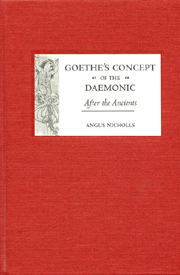Book contents
- Frontmatter
- Contents
- Editions and Abbreviations
- Acknowledgments
- Introduction
- 1 The Ancients and Their Daemons
- 2 The Daemonic in the Philosophy of the Sturm und Drang: Hamann and Herder
- 3 Romanticism and Unlimited Subjectivity: “Mahomets Gesang”
- 4 Werther: The Pathology of an Aesthetic Idea
- 5 Kantian Science and the Limits of Subjectivity
- 6 Schelling, Naturphilosophie, and “Mächtiges Überraschen”
- 7 After the Ancients: Dichtung und Wahrheit and “Urworte. Orphisch”
- 8 Eckermann, or the Daemonic and the Political
- Epilogue: Socrates and the Cicadas
- Works Cited
- Index
Introduction
Published online by Cambridge University Press: 05 February 2013
- Frontmatter
- Contents
- Editions and Abbreviations
- Acknowledgments
- Introduction
- 1 The Ancients and Their Daemons
- 2 The Daemonic in the Philosophy of the Sturm und Drang: Hamann and Herder
- 3 Romanticism and Unlimited Subjectivity: “Mahomets Gesang”
- 4 Werther: The Pathology of an Aesthetic Idea
- 5 Kantian Science and the Limits of Subjectivity
- 6 Schelling, Naturphilosophie, and “Mächtiges Überraschen”
- 7 After the Ancients: Dichtung und Wahrheit and “Urworte. Orphisch”
- 8 Eckermann, or the Daemonic and the Political
- Epilogue: Socrates and the Cicadas
- Works Cited
- Index
Summary
On Tuesday, 9 November 1830, Johann Wolfgang Goethe recommenced work on the fourth part of his autobiography, Dichtung und Wahrheit (Poetry and Truth, 1811–33). During the following day, Goethe received the news that his son August had died while traveling in Italy. The news of his son's death came at a crucial time in Goethe's life. At eighty-one years of age Goethe was an elderly man, and accordingly he and his staff were engaged with the task of preserving his literary legacy and creating an appropriate image of the great poet for posterity. Goethe's assistant Johann Peter Eckermann was assigned the role of recording his conversations, while Friedrich Wilhelm Riemer was entrusted with preparing a definitive edition of Goethe's complete works, the Ausgabe letzter Hand (literally the “Edition of the Last Hand,” the last edition overseen by the author himself, published between 1827 and 1842). While reacquainting himself with part 4 (book 20) of Dichtung und Wahrheit during probably the most difficult period of his life, Goethe would no doubt have been confronted with the following passage, written around April 1813, and widely recognized as his most comprehensive statement on a mysterious phenomenon he named das Dämonische (the daemonic). Writing about himself in the third person, Goethe observes:
Er glaubte in der Natur, der belebten und unbelebten, der beseelten und unbeseelten etwas zu entdecken, das sich nur in Widersprüchen manifestierte und deshalb unter keinen Begriff noch viel weniger unter ein Wort gefaßt werden könnte. […]
- Type
- Chapter
- Information
- Goethe's Concept of the DaemonicAfter the Ancients, pp. 1 - 31Publisher: Boydell & BrewerPrint publication year: 2006

